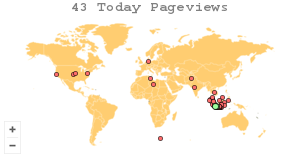Pandangan Ulama Woyla Terhadap Ayat-Ayat Kepemimpinan Perempuan
DOI:
https://doi.org/10.47498/bashair.v5i1.4321Keywords:
Woyla Scholars, Leadership Verses, WomenAbstract
The belief that women are weak and inferior has been a long-standing discussion in the Woyla community, leading to the perception that women are unfit for leadership, much like the classical scholars who largely prohibited women from leading. However, most contemporary scholars allow female leadership, interpreting the same Qur'anic verses differently. This study focuses on the views of dayah scholars in Woyla, Aceh Barat, aiming to explore their stance on female leadership and whether the Qur'an explicitly addresses this issue. Field research reveals that the majority of dayah scholars in Woyla hold that women should not be leaders, citing Surah An-Nisa, verse 34, as a basis for their argument. Nonetheless, they allow women to lead in specific areas outside of household and family matters, relying on Qur'anic verses that emphasize human equality and the mutual support of individuals without distinguishing between male and female. This nuanced understanding shows that while traditional views may restrict women’s leadership in certain domains, there is space for female leadership in other contexts based on broader interpretations of equality in the Qur’an.
References
Al-Mawardi. (2015). Al-Ahkam Al-Sulthaniah. (K. Fath, & Fathurrahman, Penerj.) Jakarta: Qistthi Press.
Amin, M. (2022). Kepemimpinan Perempuan Dalam Perspektif Mufassir Aceh: Studi Komparatif Tafsir Tarjuman Al-Mustafid Karya Abdurrauf As-Singkily Dengan Tafsir An-Nur Karya Muhammad Hasbi Ash-Shiddieqy. Jakarta: Institut PTIQ Jakarta. Diambil kembali dari https://repository.ptiq.ac.id/id/eprint/668/
Ash-Shalabi, M. A. (2012 ). Sejarah Lengkap Rasulullah saw: Figh dan Studi Analisa Komprehensif. Jakarta: Pustaka Al-Kautsar.
Basri, H. (2018). Kepemimpinan Politik Perempuan Dalam Pemikiran Mufassir. Al-Daulah: Jurnal Hukum dan Ketatanegaraan, 7(1), 51-66. doi:10.24252/ad.v7i1.5313
Depdiknas, D. P. (2002). Kamus Besar Bahasa Indonesia (3th ed.). Jakarta: Balai Pustaka.
Echols, J. M., & Shadily, H. (2003). An English-Indonesian Dictonary. Jakarta: PT.Gramedia.
Farida, F. (2019). Kepemimpinan Wanita Dalam Al-Qur`an (Studi Komparatif Tafsir al-Misbah dan Tafsir Ibnu Katsir). Lampung: UIN Raden Intan Lampung. Diambil kembali dari https://repository.radenintan.ac.id/5494/
Habibi, D. M. (2017). Penafsiran Al-Qur’an Surah Al-Maidah ayat 51. Yogyakarta.
Hartono, R. (2021). Kepemimpinan Perempuan Era Globalisasi. Jurnal Pancasila dan Kewarganegaraan (JUPANK), 1(1), 82-99.
Herlambang, S. (2018). Pemimpin dan Kepemimpinan Dalam Al-Qur’an. Pontianak : Ayunindya.
Kayo, R. K. (2005). Kepemimpinan Islam dan Dakwah. Jakarta: Amzah.
Khaldun, I. (1998). Tarikh Ibn Khaldun. Beirut : Dar al-Fikr.
Muhammad, H. (2002). Fiqh Perempuan: Refleksi Kiai atas Wacana Agama dan Gender. Yogyakarta: LKIS Yogyakarta.
Purnamasari, D. (2016). Persepsi Ulama Tentang Keterlibatan Perempuan Dalam Bidang Politik di Aceh Selatan. Medan: Universitas Islam Negeri Sumatera Utara. Diambil kembali dari https://repository.radenintan.ac.id/5494/
Quthub, S. (1995). Fi Zhilal al-Qur’an. Bairut: Dar al-Fikr.
Razali, M., Mansur, M., Hanif, & Al-Fairusy, M. (2021). Konsep Kepemimpinan Perempuan Dalam Pandangan Abdur Rauf As-Singkili. BASHA'IR: Jurnal Studi Al-Qur'an dan Tafsir, 1(2), 85-94. doi:10.47498/bashair.v1i2.867
Shihab, M. Q. (2002). Tafsir Al-Misbah: Pesan, Kesan, dan Keserasian Al-Qur’an (Vol. VIII). Jakarta: Lentera Hati.
Umar, N. (2001). Argumen Kesetaraan Jender Perspektif al-Qur’an. Jakarta: Paramadina.
Downloads
Published
Issue
Section
License
Authors who publish articles in Basha'ir: Jurnal Studi Al-Qur'an & Tafsir agree to the following conditions:
- The author retains copyright and grants the Basha'ir Journal the right from the first publication with the work simultaneously licensed under a Creative Commons Attribution-ShareAlike 4.0 International (CC BY-SA 4.0) license that allows others to make changes, adjust and build on the work with recognition of the author's work and initial publication in the Journal.
- Authors are allowed to copy and redistribute published versions of works in journals (for example, posting them to institutional repositories or publishing them in a book), with recognition of their initial publication in Basha'ir: Jurnal Studi Al-Qur'an & Tafsir.
- Authors are allowed and encouraged to post their work online (for example, in institutional repositories or on their websites) before and during the submission process, as it can lead to productive exchanges, and increase citations of published works





